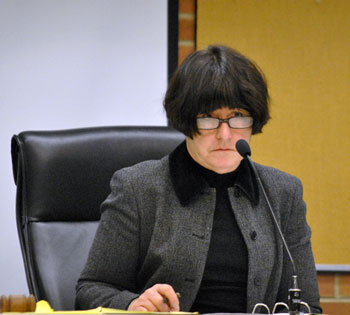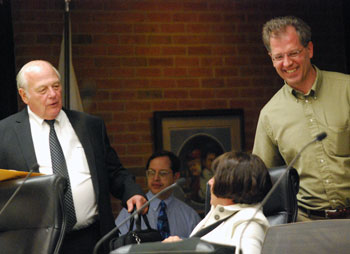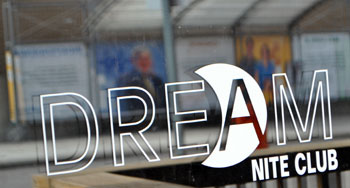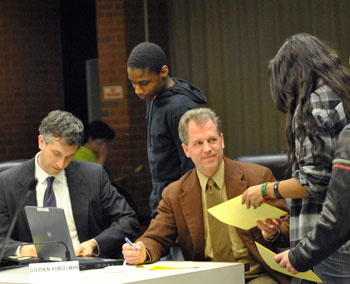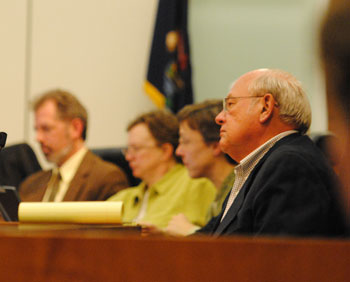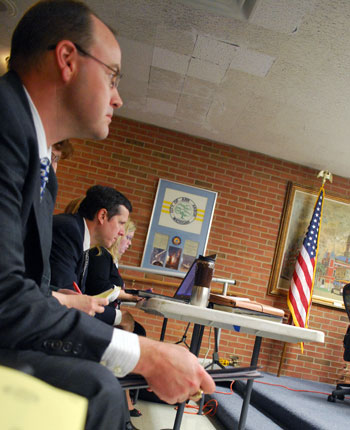Editor’s note: This “Live Updates” coverage of the Ann Arbor city council’s Jan. 21, 2014 meeting includes all the material from an earlier preview article published last week. We think that will facilitate easier navigation from live-update material to background material already in the file.
The Ann Arbor city council’s second regular meeting in January is shifted to the Tuesday following the national holiday honoring the birthday of Martin Luther King Jr. Highlights of the Jan. 21 meeting agenda include three items related to development in the city – one for a specific project downtown and two others related to zoning regulations.
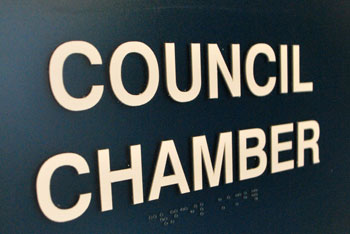
The sign on the door to the Ann Arbor city council chamber, installed in the summer of 2013, includes Braille.
The council will be asked to approve the site plan for a revised, expanded version of the 624 Church St. project, located in the block just south of South University Avenue. An earlier version of the project went through the planning review process about a year ago, with city council approval coming on March 4, 2013.
The revised plan is for a 14-story, 116,167-square-foot building with 123 units and about 230 bedrooms. The apartment building would stand adjacent to and over the existing two-story restaurant at 618 Church, and would extend to the southeast corner of Willard and Church, where the building’s entrance will be located. Existing buildings at 624 Church Street and 1117 Willard would be torn down. The city planning commission recommended approval of the revised plan at its Dec. 17, 2013 meeting.
Also on the Jan. 21 agenda are possible future changes to the city’s downtown zoning regulations. A public hearing on the matter will be held at the Jan. 21 meeting. Three of the recommendations relate to specific parcels: (1) Rezone the parcel located at 336 E. Ann from D1 (downtown core) to D2 (downtown interface); (2) Reduce the maximum height in the East Huron 1 Character District (on the north side of Huron, between Division and State) to 120 feet. Include a tower diagonal maximum and consider a step-back requirement to reduce the shading of residential properties to the north; (3) Rezone the parcel at 425 S. Main, at the southeast corner of Main and William, from D1 (downtown core) to D2 (downtown interface) and establish a maximum height of 60 feet for D2 zoning in the Main Street Character District. Several other recommendations focus on the issue of “premiums” – certain features that a developer can provide in exchange for additional square footage.
It’s likely that amendments will be brought forward during the Jan. 21 meeting that would alter the original resolution.
But the decision on the 624 Church St. project will come long before the zoning revisions could be enacted. And the changes – recommended by the city’s planning commission at its Dec. 3, 2013 meeting – are focused on parts of downtown Ann Arbor other than the South University area. The council’s Jan. 21 resolution, if approved, would direct the planning commission to translate its recommendations into proposed ordinance language, which would require review and a public hearing. The specific ordinance language would then be recommended by the planning commission to the city council, which would make the ultimate decision. In general, the planning commission’s downtown zoning recommendations aim to create more of a buffer between downtown development and adjacent or nearby residential neighborhoods.
Also its Jan. 21 meeting, the council will be asked to give initial approval for the zoning of two unzoned properties on South State Street – 1643 and 1645 S. State. They are proposed to be zoned C1 (local business district). One of those properties houses Biercamp Artisan Sausage and Jerky. The currently unzoned parcels – located in Ward 4 just south of Stimson and the Produce Station – are owned by Stefan Hofmann. The zoning for these parcels, which were annexed into the city from Ann Arbor township in 2011, has previously been considered by the planning commission.
In another item related to South State Street property, the council will be asked to approve a $25,550 contract with Atwell LLC for environmental site assessment services to evaluate 2500 S. State St. That’s the Edwards Brothers Malloy property for which the council is currently exploring options to purchase. The item was added to the agenda last Friday, after the initial publication of the agenda.
Also on the Jan. 21 agenda are two items related to construction of sidewalks. One resolution involves a sidewalk gap from the northeast corner of Penberton Court and Waldenwood northward – to connect to a path leading the rest of the way to King Elementary School. The council had already authorized $10,000 for the design and public process budget at its Aug. 8, 2013 meeting. A small amount of that was spent. To cover the $16,000 construction cost, an additional $6,818 of general fund money is being requested at the Jan. 21 meeting. The other sidewalk item is the first of four steps in the process to impose a special assessment on property owners for a sidewalk on the east side of Pontiac Trail, between Skydale and Dhu Varren Road.
The council will also be asked to extend the contract with the city’s public art administrator, Aaron Seagraves, by six months – through June 30, 2014 – and to add $18,500 to his compensation to cover the added term. It’s a part-time position.
Another agenda item is for a recommendation that the Michigan Liquor Control Commission approve a special downtown development liquor license for the Lunch Room at 407 N. Fifth Avenue. The council also will be asked to approve a change in the classification of Silvio’s Organic Pizza license from a Tavern License to a Class C License, to allow for the sale of liquor in addition to beer and wine. Silvio’s is located at 715 N. University Ave.
The council’s consent agenda includes two contracts related to the sobriety court, one of the 15th District Court’s specialty courts. The consent agenda also includes street closures in connection with three events: Winter Warriors, Shamrocks & Shenanigans, and the University of Michigan Big House 5K.
This article includes a more detailed preview of many of these agenda items. More details on other agenda items are available on the city’s online Legistar system. The meeting proceedings can be followed Tuesday evening live on Channel 16, streamed online by Community Television Network starting at 7 p.m.
The Chronicle will be filing live updates from city council chambers during the meeting, published in this article below the preview material. Click here to skip the preview section and go directly to the live updates. The meeting is scheduled to start at 7 p.m. [Full Story]






